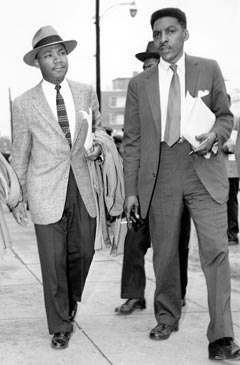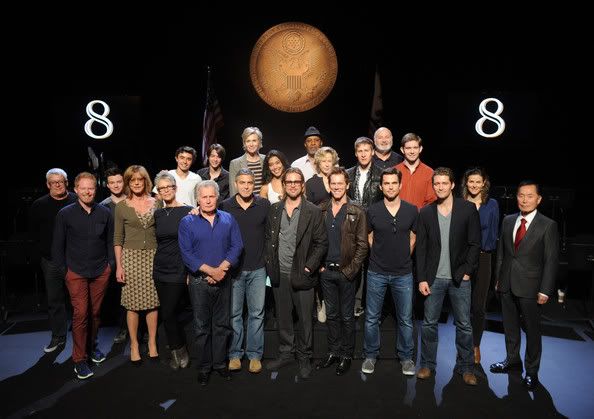Duncan Grant
Duncan Grant's JournalCivil Rights Gay Pioneer Bayard Rustin Awarded 100th Birthday Proclamation

The proclamation was presented last night by Berkeley City Councilmember Darryl Moore at the Berkeley City Council meeting, and a copy of the proclamation (image, above; full size, here,) once signed by Mayor Bates, was sent, along with the statement below, directly to The New Civil Rights Movement.

Dr. King (L) and Bayard Rustin (R)
“Bayard Rustin was one of the lead organizers and strategists for the March on Washington for Jobs and Freedom in August of 1963, who also brought Gandhi’s nonviolent protest techniques to the American Civil Rights Movement, and helped mold Dr. Martin Luther King, Jr. into an international symbol of peace and nonviolence,” Councilmember Moore said in a statement to The New Civil Rights Movement. “Bayard Rustin has gone largely unrecognized for his role in the Civil Rights Movement because he was openly gay. It was feared that having an openly gay advisor would discredit the efforts of Dr. Martin Luther King, Jr. and the other leaders of the African-American Civil Rights Movement.”
Councilmember Darryl Moore, who also serves as Board Chair of the National Black Justice Coalition (NBJC), the leading national black LGBT civil rights organization, wanted to take the opportunity during Bayard Rustin’s 100th Birthday to shine a light on his lifetime of accomplishments. “Bayard Rustin is best known for his role in the Civil Rights Movement, but he was also hugely involved in the labor movement, international human rights and was a stalwart of the LGBT community,” says Moore. “He really was an incredible person who has changed our world in ways that we have not properly recognized nor appreciated.”
Read the full article at The New Civil Rights Movement.
Watch: "8": A Play about the Fight for Marriage Equality (youtube)
"You can still watch “8” L.A. premiere for a limited time. See Brad Pitt, George Clooney, Martin Sheen and Kevin lead and all-star cast in Dustin Lance Black’s documentary play about the Prop. 8 trial. Please share this video with your friends and family so everyone can know the truth about marriage equality." -- (from American Foundation for Equal Rights (AFER) facebook page).
View the entire staged reading at this youtube link. Please share far and wide.

In This Photo: Brad Pitt, Dustin Lance Black, Matthew Morrison, Chris Colfer, Bridger Zadina, Matt Bomer, Rory O'Malley, Vanessa Garcia, Cleve Jones Jesse Tyler Ferguson, Yeardley Smith, James Pickens Jr., Jansen Panettiere, Rob Reiner, George Clooney, Kevin Bacon, Martin Sheen, Jamie Lee Curtis, Christine Lahti, Jane Lynch, Campbell Brown George Takei
Washington State Passes Same-Sex Marriage Bill
The measure easily passed the State Senate last week, 28 to 21, despite concerns that the vote would be close.
The developments in Washington parallel an appeals court decision in California on Tuesday in which a panel of judges ruled 2 to 1 to strike down that state’s ban on same-sex marriage, known as Proposition 8. The two deciding judges wrote that the ban violated the Constitution’s Equal Protection Clause.
Washington is among more than 30 states that have passed laws defining marriage as between a man and a woman, but it has steadily expanded rights for gay couples since 2007. That year, the Democratically controlled Legislature approved domestic partnerships. In 2009, it passed an “everything but marriage” bill. Full marriage rights began speeding toward approval last month, when Ms. Gregoire, a Democrat, announced that she would support the bill to make same-sex marriage legal.
The governor had previously said that she did not believe the state was ready for same-sex marriage and that churches should play a decisive role on the issue. Ms. Gregoire’s marriage bill, modeled after one approved by New York last June, allows churches and religious groups to choose not to perform same-sex marriages and to deny same-sex couples access to their facilities for marriage services.
New York Times
Seven LGBT African-Americans Who Changed The Face Of The Gay Community

Mabel Hampton, lesbian activist and archivist
African-Americans, though, have always been a party of the gay community—both as members and as allies. NAACP president Benjamin Jealous told the audience at the recent Conference on LGBT Equality, “if you pick a fight with my brother—whether it is because you say we ain’t like you or he ain’t like us—you have picked a fight with me.”
Many gays of color have made their mark on America, including writers James Baldwin (above), Langston Hughes, Audre Lorde and E. Lynn Harris; directors Patrik Ian-Polk (Noah’s Arc), Paris Barclay (Glee, Sons of Anarchy) and Lee Daniels (Precious); pro basketball players Sheryl Swoopes and John Amaeche (right); singers Meshell Ndegeocello and Kele Okereke (Bloc Party)—and even a Republican mayor, Bruce Harris of Chatham, NJ.
Today is the start of Black History Month, and Queerty is taking a look at seven gay African-Americans who weren’t just pioneers in their chosen fields, but who paved the way for all of us.

Bill T. Jones, choreographer/dancer
Full article here.
The Incredible Case of the Infamous Lower Haight Abortion Mill (Hospital)
A compelling read (written by Andrew Dudley): politics, corruption, and hidden history in San Francisco -- covering the period 1922 - 1946. As a pro-choice advocate, I found this to be an amazing glimpse into the past.
Read the full post at haighteration.

Inez was born into a poor family, and by all accounts her childhood was difficult. At a young age, she was forced to quit school to work in a pickle factory. Her father abandoned the family when Inez was just a few years old, leaving her mother to raise her and her three siblings.
When Inez was a teenager, her mother remarried, and the family moved to San Francisco. There, Inez got a job working as a manicurist at the Palace Hotel.
Described as striking and shapely, Inez quickly garnered many regular male customers eager to take advantage of her manicuring services. One of these men was an elderly physician by the name of Dr. West. He was a full-time abortionist, and he would change the course of Inez’s life.
Jumping Beyond the Broom: Why Black Gay and Transgender Americans Need More Than Marriage Equality

While some states and the federal government continue to expand protections for lesbian, gay, bisexual, and transgender people, more than half of all states still deny them basic civil rights. Such systemic inequities render people of color who are also gay and transgender among the most vulnerable in our society
Black gay and transgender Americans in particular experience stark social, economic, and health disparities compared to the general population and their straight black and white gay counterparts. According to the data we currently have, families headed by black same-sex couples are more likely to raise their children in poverty, black lesbians are more likely to suffer from chronic diseases, and black gay and transgender youth are more likely to end up homeless and living on the streets.
<snip>
In short, black gay and transgender people fall through the cracks when lumped under either a gay or black umbrella. Such categorical thinking ignores the fact that black gay and transgender people are at once both gay and transgender and black. As a result they experience complex vulnerabilities that stem from the combination of racial bias and discrimination due to their sexual orientation and/ or gender identity. So advocacy agendas that prioritize the eradication of one bias over the other do not fully respond to the needs of the population—nor will they eliminate the inequities discussed in this report.
Going forward, it is necessary to find policy solutions that will empower black gay and transgender people rather than fragment them. And we need to move beyond the dichotomy of race versus sexual orientation or race versus gender identity to do so. Scholars such as Kimberle Crenshaw, Cathy J. Cohen, and C. Nicole Mason offer frameworks for applying this intersectional lens to policy analysis and advocacy in order to understand how race, class, gender, sexual orientation, and gender identity influence public policy choices at the national, state, and local levels, as well as individual outcomes. Our analysis is drawn in part from their theories.
Colorlines Magazine featured this story last Friday, (1/20/12) but the information above comes from The Center for American Progress. If you're making an effort to become a better ally and advocate for LGBT POC, this is a great place to start.
Hidden in the Open: A Photographic Essay of 140-Years of Black Male Couples

Although the large majority of the pictures depict gay couples, the collection also includes images of families and friends but they all have one thing in common: they capture images of love.
Below is a snippet of why Kelly started the collection along with a few photos from his archive.
Historically, the Afro American gay male and couple has largely been defined by everyone but themselves. Afro American gay men are ignored into nonexistence in parts of black culture and are basically second class citizens in gay culture. The black church which has historically played a fundamental role in protesting against civil injustices toward its parishioners has been want to deny its gay members their right to live a life free and open without prejudice. Despite public projections of a “rainbow” community living together in harmonious co-habitation, openly active and passive prejudices exist in the larger gay community against gay Afro Americans.
Full article and more photos at Colorlines.com

Profile Information
Gender: Do not displayHometown: Northern California
Member since: 2003 before July 6th
Number of posts: 8,262